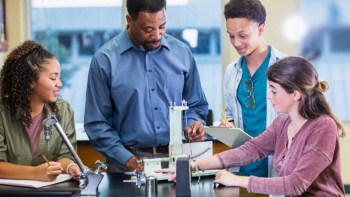Nicolas Labrosse says that UK research funders must accept their responsibility to fund higher education research in physics

Over the past century the Institute of Physics (IOP), which publishes Physics World, has strengthened the case for physics by highlighting the many benefits that the discipline brings to society. Those advantages include not just technological developments but education too, both of which allow physicists to apply their knowledge and skills to understand and improve the world. However, training a person to “think like a physicist” requires time, effort and a supportive environment, which is why strengthening physics teaching in schools and boosting diversity are so important.
While the foundations of physics knowledge are usually established at school, it is at university that physicists really gain the skills that they need for a successful career in academia or industry. Such skills are a mix of the highly technical – for example, advanced computer simulations – and the generic such as communication and team-working skills. So, to train the next generation of physicists as best as we can, it is essential we understand not just how students learn but how students learn physics too.
Talking points
Those issues will be tackled this month at a meeting jointly organized by the IOP’s higher education and history of physics groups. Examining developments in physics teaching and learning in higher education during the last century, the meeting will touch on changes in the way students learn and have been taught over the past 100 years. Many factors have played a role in those changes, including revolutions in physics, technology and society. Breakthrough discoveries can be gamechangers when it comes to teaching, explaining and illustrating difficult concepts. Meanwhile, the advent and democratization of tools enabling communication with almost unlimited numbers of other individuals and access to an overwhelming volume of information have also completely changed how we teach. Even events like the two world wars or the current COVID-19 pandemic have massively disrupted learning and teaching in higher education.
Following lockdown earlier this year, the learning and teaching community came together to address some of the most pressing issues that affect physics higher-education institutions. The Learning and Teaching in Higher Education-Physics held several virtual meetings that became a place where colleagues could share ideas. Issues that were touched upon included how to move teaching online, how to run and assess labs, lectures, group work and tutorials, as well as how to be more inclusive and better supervise postgraduate research students. Common sense, self-reflection and experience all play a big part in defining individual approaches to teaching undergraduate or postgraduate students. Yet what is clear is that there is a real need for more research in this area.
The most important developments in physics higher-education research have emerged from other countries such as the US
Setting goals
We all recognize the importance of evidence-based research, but it takes time and money – both of which are scarce. Academics researching physics learning and teaching at university level have significant teaching and administration duties and it is often a challenge to find the time to design and successfully run research experiments in physics education. Sadly, external research funding to support postgraduate researchers and pay the salaries of researchers to do this work is extremely rare. There are no opportunities to compete for grants that would allow for the development of consistent and sustainable research programmes on how students from diverse backgrounds learn physics – a subject with many practical, mathematical, conceptual and technical challenges.
Thanks to one-off funding initiatives and to the dedication of people who care deeply and passionately about educating physics students, there has been some good work in physics higher-education research in the UK. But the most important developments in the field have emerged from other countries – especially those that have made significant streams of funding available to researchers. Of particular note is the US National Science Foundation, which for years has consistently supported physics education research.
Looking ahead towards the next hundred years of physics in the UK, it is high time that UK research councils fund researchers appropriately and stop neglecting the benefits that physics higher-education research brings to the training of the next generations of physicists. UK Research and Innovation (UKRI) – the umbrella organization for the UK’s seven research councils – must therefore recognize its responsibility to adequately support higher education research in physics as well as in other technical subjects. The IOP, together with its sister learned societies, can play a big role in guiding UKRI towards achieving this important goal for university education. The physics higher-education community is ready to help.



